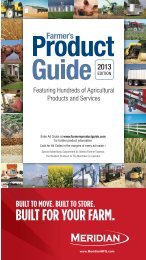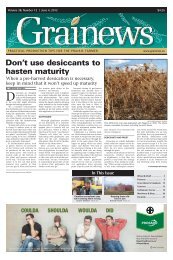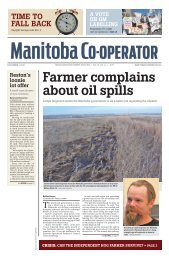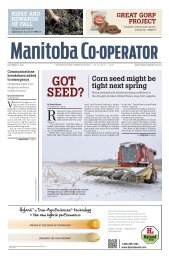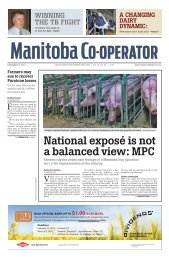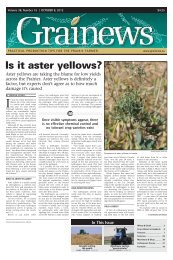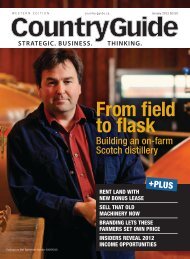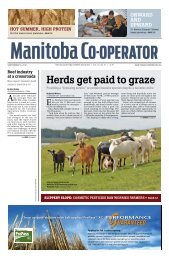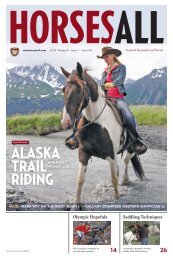Create successful ePaper yourself
Turn your PDF publications into a flip-book with our unique Google optimized e-Paper software.
The Manitoba Co-operator | July 12, 2012 3<br />
SUMMER CROPS PALETTE<br />
The beautiful colours of summer — green, yellow and blue. This picture is of the yellow canola fields the green grass and all looking towards Whitewater Lake,<br />
east of Deloraine Man. taken on July 8, 2012. PHOTO: SHARLENE BENNIE<br />
American antibiotic<br />
debate worries Canada<br />
The federal government is raising concerns over antibiotic misuse<br />
By Alex Binkley<br />
CO-OPERATOR CONTRIBUTOR / OTTAWA<br />
The federal government has<br />
finally gone public about its<br />
efforts to promote sensible<br />
use of antibiotics in livestock and<br />
humans to prevent the emergence<br />
of drug-resistant superbugs.<br />
Until Brian Evans, Canada’s<br />
chief food safety officer and chief<br />
veterinarian, issued a statement in<br />
early July (See <strong>Page</strong> 5), it took a lot<br />
of digging through web pages and<br />
statements to get a picture of what<br />
was happening in Canada. Ottawa<br />
and the provinces have been discussing<br />
the topic for some time.<br />
South of the border, the FDA is<br />
under attack by consumer groups<br />
and the courts for not cracking<br />
down on the use of antibiotics in<br />
livestock production.<br />
Canada has to be worried that<br />
the U.S. will move to tougher<br />
restrictions on antibiotic use in<br />
livestock production that would<br />
impact meat imports from countries<br />
that don’t adopt similar<br />
rules.<br />
In his statement, Evans says<br />
resistance to antibiotics is a problem<br />
in both livestock production<br />
and human medicine, noting<br />
international organizations<br />
are trying to raise awareness. In<br />
Canada, the provinces need to<br />
pay attention to how medicines<br />
approved by Health Canada are<br />
used, he said.<br />
“By recognizing that there are<br />
risks as well as benefits associated<br />
with antimicrobials and engaging<br />
in an informative and frank dialogue<br />
with all concerned, we can<br />
ensure that these valuable tools<br />
for health professionals are used<br />
prudently in order to preserve<br />
their efficacy for treating both animals<br />
and people.”<br />
The misuse of antibiotics “in<br />
both human and animal health<br />
contributes to the development of<br />
“…The misuse of antibiotics “in both human and<br />
animal health contributes to the development of<br />
resistant bacteria, thereby posing a risk to people<br />
and animals.”<br />
BRIAN EVANS<br />
resistant bacteria, thereby posing<br />
a risk to people and animals,” he<br />
points out.<br />
The World Organisation for<br />
Animal Health has declared the<br />
fight against antimicrobial resistance<br />
as a priority and is advocating<br />
for good veterinary control<br />
of the registration, import,<br />
distribution and on-farm use of<br />
antimicrobials. The World Health<br />
Organization has warned about<br />
the emergence and spread of<br />
drug-resistant pathogens. The<br />
development “is a natural process<br />
that eventually happens with<br />
every drug.”<br />
Your smartphone<br />
Instant info. With the Manitoba Co-operator mobile app you can<br />
just got smarter.<br />
stay up to date on all things ag. Download the free app at agreader.ca/mbc<br />
Get the Manitoba Co-operator mobile app<br />
and get the latest ag news as it happens.<br />
Download the free app at agreader.ca/mbc<br />
Evans notes that WHO is concerned<br />
overuse of medicines in<br />
treating humans is contributing<br />
to drug resistance. Of equal concern<br />
is the slow pace of development<br />
of new medicines.<br />
Health Canada has determined<br />
which veterinary medicines<br />
are most important to<br />
humans and is warning against<br />
extra label use of the key ones.<br />
The CFIA also monitors drug<br />
residues in food and verifies<br />
that medicated livestock feeds<br />
meet federal standards. Over the<br />
years it has rarely found detectable<br />
levels of antibiotic residues<br />
and in almost ever case, the few<br />
it has found have been within<br />
safety limits.<br />
Evans notes that the provinces<br />
control the prescription of<br />
drugs and they should encourage<br />
veterinary and medical regulatory<br />
bodies to promote judicious<br />
use of antibiotics.<br />
According to the WHO, in<br />
human medicine, drugs are<br />
sometimes dispensed too readily,<br />
“just to be on the safe side,”<br />
often in response to patient<br />
demand. In other cases, patients<br />
do not complete the full course<br />
of treatment. In some countries,<br />
substandard products are sold<br />
and individual pills are available<br />
over the counter.<br />
On the animal side, antimicrobials<br />
are routinely used in<br />
livestock feed for growth promotion<br />
and to prevent infections<br />
in food-producing animals.<br />
Some drugs can be purchased<br />
without a veterinary<br />
prescription, or used outside<br />
the approved levels with a veterinary<br />
prescription.<br />
Linear Grain to<br />
run an elevator at<br />
Arborfield, Sask.<br />
The facility has been used to ship<br />
producer cars, whose fate is unclear when<br />
the CWB loses its monopoly<br />
By Allan Dawson<br />
CO-OPERATOR STAFF<br />
Carman-based Linear<br />
Grain is expanding its<br />
grain-buying operations<br />
in tandem with the<br />
new open market for wheat,<br />
durum and barley.<br />
Starting Aug. 1 Linear Grain<br />
will lease an elevator owned<br />
by Aborfield Grain Producers<br />
Ltd., currently used to load<br />
producer cars, and turn it into<br />
a licensed primary elevator,<br />
Ryan McKnight, Linear Grain’s<br />
grain merchandising manager,<br />
said in an interview.<br />
Under the Canada Grain<br />
Act licensed primary elevators<br />
cannot load producer cars.<br />
However, producer cars will<br />
continue to be loaded trackside<br />
by auger adjacent to the<br />
elevator<br />
“We’d absolutely look at<br />
doing this with other producer<br />
car groups if there was<br />
any interest there,” McKnight<br />
said.<br />
Most producer cars have<br />
been shipped to the Canadian<br />
Wheat Board, but their future<br />
is less certain after the end of<br />
the monopoly Aug. 1.<br />
With this new arrangement<br />
with Linear Grain, farmers<br />
near Arborfield in northwest<br />
Saskatchewan can sell to their<br />
local elevator, a 4,500-tonne<br />
wooden facility once owned<br />
by United Grain Growers.<br />
Farmers will have more<br />
choices and locally owned<br />
shortline, Thunder Rail, will<br />
benefit as well, McKnight<br />
said.<br />
“Shortlines are quite a bit<br />
more flexible than the major<br />
rail lines are,” he said. “We like<br />
that part about it.”<br />
Farmers can save $800 to<br />
$1,200 a car shipping producer<br />
cars by avoiding elevator<br />
fees. However, elevators<br />
can sometimes offer better<br />
grades and higher prices<br />
through blending. Farmers<br />
also get paid faster delivering<br />
to an elevator.<br />
Linear is looking to hire<br />
two grain buyers to staff the<br />
Aborfield elevator, McKnight<br />
said.<br />
The Aborfield elevator will<br />
purchase wheat, oats, canola<br />
barley (malting and feed) peas<br />
and flax, he said.<br />
It will also be an agent for<br />
the Canadian Wheat Board,<br />
handling pooled grains on its<br />
behalf.<br />
Farmers in the Carman area<br />
haven’t expressed much interest<br />
in using the CWB’s pools,<br />
but farmers around Aborfield<br />
indicate they’ll commit 20 to<br />
30 per cent of their wheat to<br />
the pool, McKnight said.<br />
“This is a couple of small<br />
guys working together,” he<br />
said “We’re going to try and<br />
make this little elevator run<br />
and keep the railroad going.<br />
I have confidence that it will<br />
be a successful deal and all<br />
people involved will be better<br />
served.”<br />
allan@fbcpublishing.com



